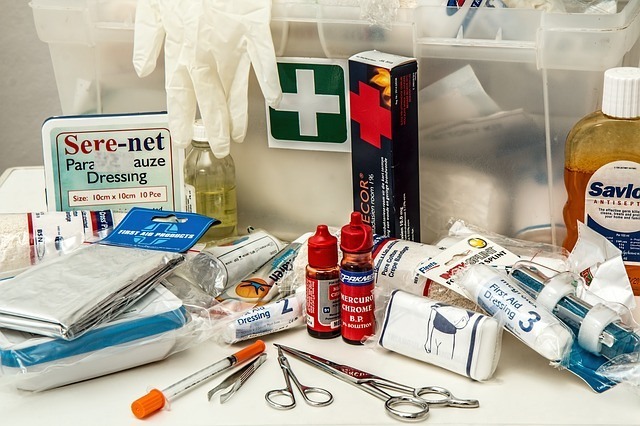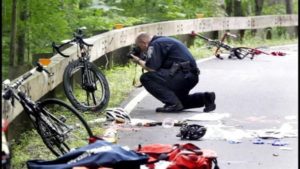Many avid cyclists carry a bike first aid kit with them to address minor injuries they (or their bike) might receive while cycling. This informative guide will help you create your own bike emergency kit that you can keep with you for emergencies. Although you can buy commercial first aid kits, when you build your own you can customize it based on your own needs, and add or subtract items as needed.
A Basic First Aid Kit for Cyclists should contain the following:
· Bandaids – a variety of sizes of bandages for small cuts and abrasions. ALL cycling first aid kits (and any medical kits) should carry an ample supply!
· Antibiotic ointment – rather than carry an entire tub, opt for several small packets of Neosporin to keep on your pack to clean cuts.
· Anti-itch cream or wipes – the wipes are super convenient as they are easily portable. These are great for treating bug bites and stings.
· Sunscreen – a small tube of strong sunblock should suffice. Be sure to apply sunscreen before you leave, and keep the sunscreen in your pack for touchups and emergencies.
· Nonstick gauze – in the event or road rash, this gauze will provide protection without adhering to the wound.
· Sterile gauze – be sure to get a small stack of gauze to absorb any blood from a cut. In a pinch, a feminine pad can work as well. The key is to stop bleeding as soon as possible.
· Tweezers – a small pair of tweezers is handy for removing dirt, gravel, and debris from cuts and road rash.
· Betadine – Betadine or a similar cleanser will allow you to clean up any wound after removing the debris.
· Tylenol and Ibuprofen – great for if you develop a head or muscle ache or experience a strain along your ride.
· Benadryl – perfect to keep on hand for allergic reactions.
· Gloves – if you fall, your hands are probably dirty. Avoid infecting your wound by wearing gloves when you dress it.
· Waterproof tape – important to adhere bandages. Also works for minor bike repairs in a pinch!
· Butterfly closures – will help stop the flow of blood and hold together larger cuts until you can get a stitch or two, if required.
· Space blanket – great for preventing shock and retaining heat in case of a major crash.
· Food – a couple of emergency bars are great to keep on hand. Amazon carries emergency food ration bars, as well. If you are going to a remote area, toss a couple of these in just in case.
· A multi-tool – a great Swiss Army knife is perfect as it provides a wide variety of tools, along with knives, and often tweezers, all in one.
· Tire repair kit – at some point, you are going to need this! Best to find a small one to carry with you so you don’t get stuck far away from home.
· Zip ties and duct tape – perfect for minor repairs and patching things up, as needed when away from home. A zip-lock bag can be helpful, as well.
· Emergency medical card – filled out with your emergency contact, any important medical information such as allergies and medical conditions, and a copy of your health insurance card. It is important to have access to medical care, even if you are in a remote location, so it is a good idea to have a cell phone with you at all times.
For a free legal consultation,
call 1-844-242-9253
· Knowledge – the most important first aid equipment you can carry with you is your own knowledge! Invest the time and (small amount of) money and take a first aid class provided by your local Red Cross. First aid and CPR training can and does help people save lives.
Any first aid kit for cyclists is not complete without an ample supply of water. Be sure to carry a Camelbak or hydration system with you, or at the very least a large bottle of water. Your bike safety kit will be a great addition for any extended rides, and may even allow you to provide support and assistance to those around you.
Click to contact our personal injury lawyers today
If you have been in a bicycle crash and have experienced injuries, you may be due compensation. The experienced team of cyclist attorneys at Kass & Moses can help you recover money for the pain, suffering, and loss you have experienced. Keep the number 1-844-BICYCLE tucked away in your cycling first aid kit and call for a free consultation if you have been involved in a crash.
Call or text 1-844-242-9253 or complete a Free Case Evaluation form


